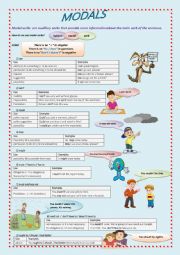
Modal verbs worksheet
This is an useful modal verbs worksheet because your students will have different types of exercises to practice the modal verbs
Level: intermediate
Age: 14-17
Type: worksheet

Types of Signs (Part 1)
It�s importat to review with students the types of signs there are (prohibition, mandatory, obligation and emergency), their colours, shapes, and what they mean. In the part 2 of types of signs you can work on modal verbs. After, you can work on �you must� for mandatory signs, �you mustn�t� for prohibition signs, you should or can for emergency sig...
Level: intermediate
Age: 12-17
Type: worksheet

Can they ... ?
Students read and answer the sentences with YES, THEY CAN or NO, THEY CAN�T. Hope you can use it. Have a great day! ;)
Level: elementary
Age: 10-16
Type: worksheet

Where am I going? Speaking cards. Role play. (MODALS FOR PRESENT DEDUCTION - It must be/ It can�t be/ It could be/ It might be)
Cards to practise modals for present deduction. Students take cards and read out the clues to their partners or to the group. After each clue, ss have to try and guess the destination. They have to use "It must/can�t/could/mig ht be..." e.g. The official language is one of the 5 most spoken languages in the world. - It MIGHT be the UK, China...
It...
Level: intermediate
Age: 10-100
Type: activity-card

you must be careful
this is a lesson plan to present tips to be careful, and to present the obligation and prohibition functions
Level: elementary
Age: 3-17
Type: lesson-plan

MODAL VERBS : CAN / MUST / MUSTN�T / NEEDN�T .......
Level: intermediate
Age: 14-17
Type:

Request cards
This is a speaking activity that can be used with modals of request. Students are given the cards and they say a modal of request using that..You can also do Pair work with this activiy.
Level: elementary
Age: 14-17
Type: activity-card

Types of Signs (Part 3)
Part 3. It�s importat to review with students the types of signs there are (prohibition, mandatory, obligation and emergency), their colours, shapes, and what they mean. It�s a great way to practice modal verbs!
Level: intermediate
Age: 12-17
Type: worksheet

Modal and semi-modal verbs. page 2 of 2
This is page 2 of modals and semi-modals. For some reason first attempt was not successful. Page 1 is on lesleymisano2. Could not be uploaded together because oversize.
Level: intermediate
Age: 12-17
Type: grammar-guide

PAGE 03 MODAL AND ASSOCIATED VERBS
MODAL VERBS AND ASSOCIATED VERBS, THEIR USES AND AN EXAMPLE OF EACH USE. A COLOUR SCHEME HELPS TO VISUALIZE SIMILAR USES EASILY.
Page 3/3
Level: intermediate
Age: 14-100
Type: grammar-guide

MODAL VERBS
Level: intermediate
Age: 14-100
Type: worksheet

British Manners (Modals)
It�s a worksheet to practise British manners together with modals (must, mustn�t, have to, don�t have to, should, shouldn�t) I hope you like it!
Level: intermediate
Age: 9-17
Type: worksheet

Modal Verbs Speaking Cards
Hi there!;)
Here�s a nice set of cards for your students to comment on different situations, using MODAL VERBS;)
They read the task on their card and make up three sentences, using one of modal verbs (CAN, CAN�T, NEED TO, HAVE TO, MUST, MAY, MIGHT, SHOULD);)
Many thanks to Jecika for a lovely template!
Use and Enjoy!;)
Level: intermediate
Age: 14-17
Type: activity-card

Must, mustn�t, have to, don�t have to
A revision of the uses of must, mustn�t, have to and don�t have to.
Answer key provided.
Thanks to magneto for the nice template.
Level: intermediate
Age: 10-100
Type: worksheet

modal verbs rephrasing
This is a worksheet for 11th graders about modal verbs - rephrasing. Many of the sentences are about gap year.
Level: intermediate
Age: 14-17
Type: worksheet
|

You should
Simple and direct way to correct use of ( should )
Level: elementary
Age: 5-17
Format: PowerPoint

Can or Can�t
Ability - explanation + exercises
Level: elementary
Age: 11-17
Format: PowerPoint

can / can�t
it�s a slide for presenting can/can�t modal. teacher first shows the examples, then learners may change the sentences by using negative form of "can". learnes may learn new action words too.
Level: elementary
Age: 10-17
Format: PowerPoint

Asking a favour/permission
Students talk about lending, borrowing objects
Level: elementary
Age: 10-100
Format: flipchart

Grammar: Frame-Elaboration Hypothesis
Level: advanced
Age: 15-100
Format: PowerPoint

Review of modal verbs, comparative form and present perfect tense
This is a ppt that I prepared for my 14 years old students, that is related to modal verbs, comparative form and present perfect tense. This is a review that I used before the test.
Level: intermediate
Age: 13-17
Format: PowerPoint

what can you do?
What can you do?Enjoy!!!
Level: elementary
Age: 7-17
Format: PowerPoint

Modals
General basic information about modals
Level: elementary
Age: 12-17
Format: PowerPoint

Modal Verb
Modal Verbs
Level: intermediate
Age: 13-17
Format: PowerPoint

The Modal-"can" Part Two
enjoy yourself!
Level: elementary
Age: 10-17
Format: PowerPoint

Modals in the present and past (should, may, might, could, must)
This power point contains a very simple way of explaining the meaning and form of modals in the present and in the past. I hope it is useful.
Level: advanced
Age: 14-17
Format: PowerPoint

May
Explanation and examples of main uses of MAY
Level: intermediate
Age: 14-17
Format: PowerPoint

modes
a powerpoint going through the varying types of modes and dealing with verbs
Level: advanced
Age: 14-17
Format: PowerPoint

DAFFODILS
This is a popular poem by William Wordsworth.
Level: intermediate
Age: 14-17
Format: PowerPoint

verb can
can for permission, ability, possibility.
Level: elementary
Age: 7-17
Format: PowerPoint
|
|